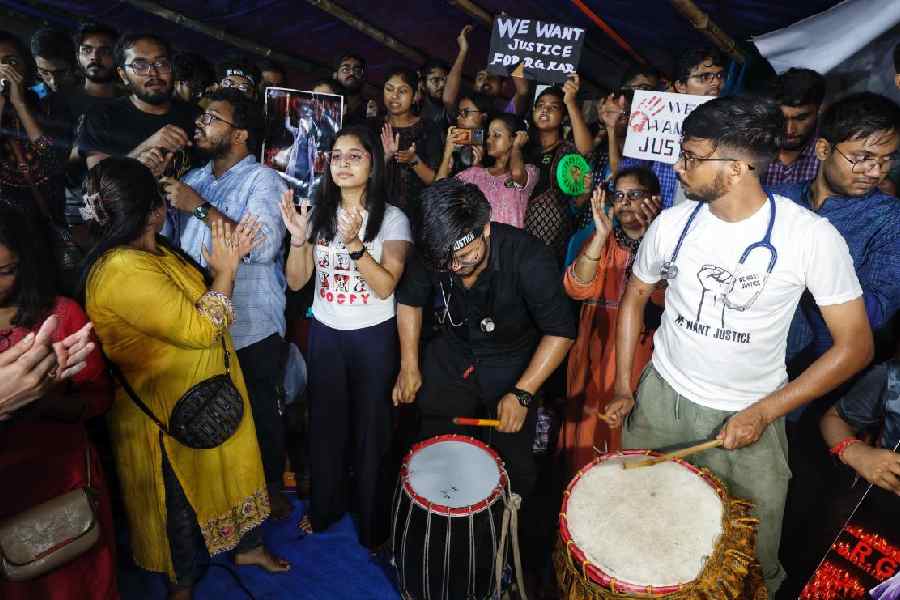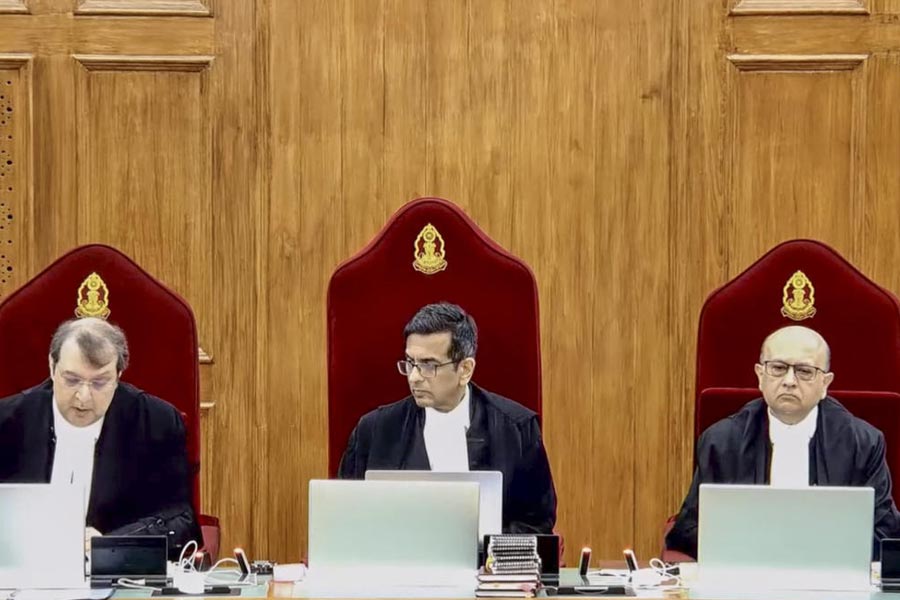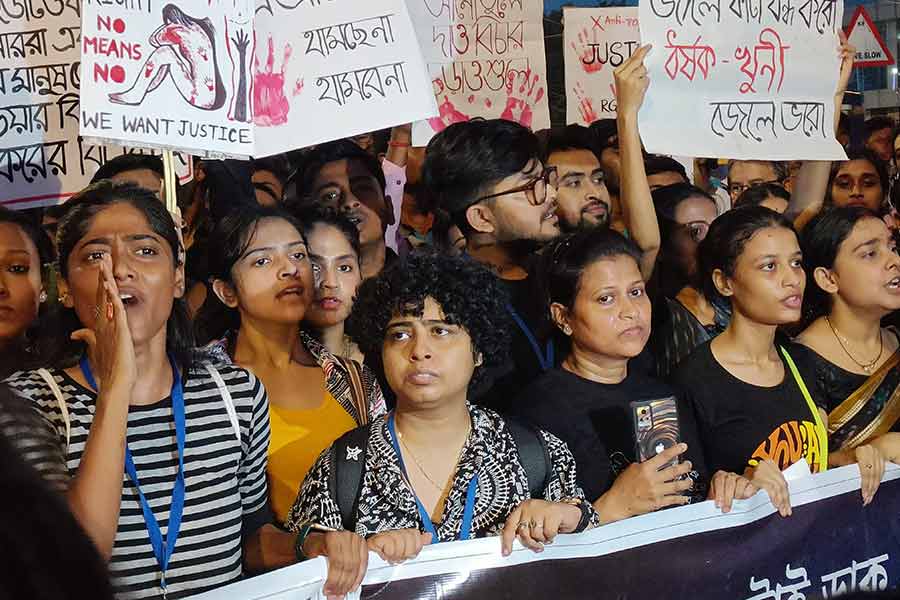For the last few weeks or so, Supreme Court hearings to monitor investigation into the rape and murder of an on-duty doctor in a state-run hospital have been holding a mirror to the rot that has embedded itself in today's Bengal.
Day after day – there have been four hearings till now – the nation witnessed live coverage of proceedings that, in effect, unveiled a horrifying picture of systems having gone to seed to perpetuate an ever-widening circle of corruption in the state's health sector in addition to shocking administrative and police lapses that were apparently sought to be covered up by a ruling establishment that seems to have lost all connection with the real world.
Lawyers argued that police procedures weren't followed while first reporting (delayed FIR), and then investigating (‘tampering’ of the crime scene) the rape and murder of the 31-year-old post graduate trainee of RG Kar Medical College and Hospital; they spoke of ill-lit hospital areas that needed CCTV vigil, split hairs over security issues concerning doctors when clearly existing arrangements, the backbone of which is not the state police but a bunch of civic volunteers, are grossly inadequate, leaving the three-judge bench exasperated and exhausted at the litany of institutionalised shortcomings.
On the question of a missing challan that is prerequisite during an autopsy, one judge commented how in his career as a custodian of the law he had never seen such violations. On the question of the hurried reinstatement of the principal of the college – he has since been arrested – the chief justice was aghast, censuring the state government and even questioning the conduct of the health official who mentioned suicide as a possible cause of death while informing her parents over the phone.
On the findings of the CBI so far, details of which were presented to the apex court in a sealed cover, the chief justice had only one comment to make: deeply disturbing.
In court, therefore, the nation got to see the tragic spectacle of a state that is in the depths of ruin in terms of administrative and moral decline. Can there be a more severe indictment of an elected state government? While setting up a national task force to look at doctors’ security threadbare, the apex court has had to issue several directives for the state to follow to ensure a safe environment for the striking doctors to return to work. That it has agreed with doctors' demand to replace ad-hoc security volunteers, even if trained, with state police personnel is indication enough of where it stands vis-a-vis the plight of junior doctors.
On the ground too, outside of the hallowed precincts of the Supreme Court, the state government's conduct in dealing with the aggrieved junior doctors has been all too revealing.
The vandalism of the hospital that was allowed on a night of protest reinforced fears of big brother striking back. The chief minister pompously embarking on a protest march to demand justice for the doctor failed to cut ice with the people who had by then joined the protesting doctors in a spontaneous show of solidarity.
The state government hurriedly passing fresh legislation to sanction the death penalty for rapes was headline management at best, for it is not the lack of laws but their poor implementation that needs to be looked at. Even the knee-jerk announcement of Rattirer Shaathi, a supposed security plan for women healthcare workers, smacked of regressive thinking for suggesting that as far as possible, women should not be asked to work at night. Here too the Supreme Court had to intervene and order the bizarre provision that sought to limit women's participation in the labour force in the name of safety be struck down.
All this is the outcome of the state's insular thinking flourishing in a decision making process that is too centralised with the chief minister allowing herself the counsel of only a handful of people, among whom is a senior police officer and a few bureaucrats, leaving out on most occasions her cabinet colleagues.
It is precisely this administrative playbook that has spawned the emergence of an all-powerful “health syndicate”, a cabal of doctors, officials and hangers on that enjoys a stranglehold on the affairs of the department.
Today, the doctors have been on strike, spending days and nights on the street near the state health department with people from all walks of life joining in. The power has shifted to the streets. That the chief minister has had to acknowledge this, albeit grudgingly, was evident in her sudden visit to the protesters' makeshift den of tarpaulin sheets and camp cots. She displayed sympathy and understanding by extending a tea invitation to around 40 of them when they trooped into her residence for talks but refused to go ahead with discussions even though the doctors relented on their demand for live-streaming.
The next day, however, the chief minister met them and agreed to most of their demands, primarily the shunting out of key health department officials and policemen, including the city police commissioner, whom the junior doctors hold responsible for allowing the crime scene to be tampered with. In the end, Didi, who believes she is unimpeachable, had to relent.
The criminal nexus that led to the RG Kar doctor’s death will be unravelled, partially if not totally. But it will be the spark that lights the fire of change. Eventually, the doctors will have to return to work; if not today, tomorrow. It will, however, be extremely difficult for Mamata Banerjee to turn around the high-tide of public opinion that is now sweeping the state against her government. Yet, it is not entirely impossible either, provided she starts from a position of genuine intent.
To begin with the chief minister must understand and acknowledge that the protesting doctors are up against huge odds. For, they have plunged into this clean-up mission risking their careers, knowing that this battle pits them directly against a section of their fraternity that has been keenly aligned to the ruling clique to reap benefits of the spoils.
For one who swept to power on the promise of paribartan (change), it is no longer enough to deliver pious platitudes, fall back on pleading helplessness at having inherited a faulty system from her predecessors.
It would do her, and the state, good if she pays heed to what the feisty legal luminary representing the junior doctors said in the Supreme Court: Don’t be in denial.













